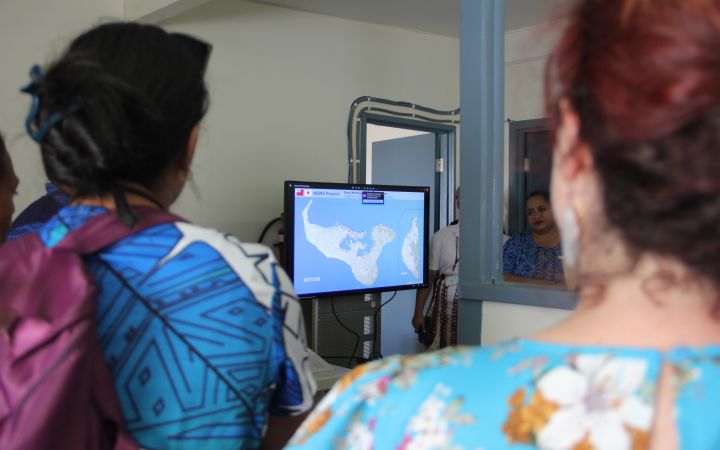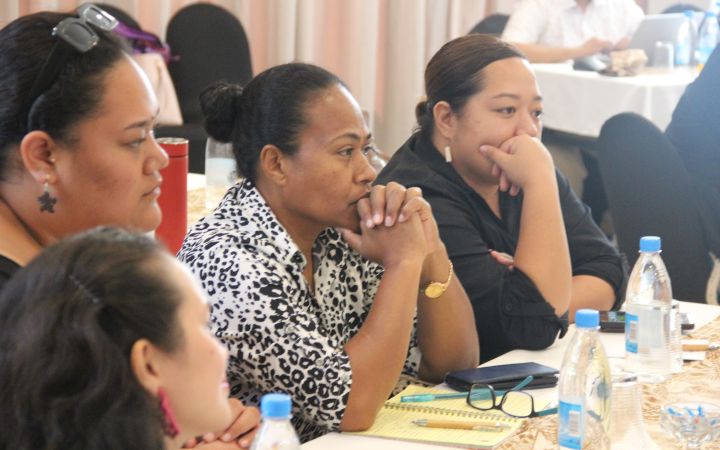Rapid Response to Climate Crises Through Early Warning Systems
- Pacific Island nationals are invited to apply for the “Leave No One Behind: Rapid Response to Climate Crises through Early Warning Systems” training programme.
- The programme will teach individuals how to effectively disseminate, monitor, analyse and respond to early warning systems for climate-related hazards and extreme weather events.
- The programme will be in English and will run in two phases from July to November 2024. The first phase will be online, and the top performers will be invited to join the second phase in Japan.
- UNITAR certificates of completion will be issued to those who meet course requirements.
- As of 5 July, the application deadline is 12 July 2024 at11:59 P.M. JST (UTC+9).
10 June 2024, Hiroshima, Japan – UNITAR invites professionals from the Pacific Islands to apply to the “Leave No One Behind: Rapid Response to Climate Crises through the Early Warning Systems" training programme for the Pacific Islands. The programme will teach participants how to effectively disseminate, monitor, analyse and respond to early warning systems for climate-related hazards and extreme weather events. As of 5 July, the application deadline is 12 July 2024 at11:59 P.M. JST (UTC+9).
The programme will be in English and is scheduled to run in two phases from July to November 2024. The first phase will be online, and top performers will be selected to join the second phase in Japan. Participants who complete all course requirements will receive a UNITAR certificate.
The training programme is offered free of charge, thanks to the financial support of the Government and People of Japan. It is part of UNITAR’s new initiative, “Shimanami Collective: Capacity Building for Asian and Pacific Island Countries”, a series of training programmes to build resilience against disasters and to enhance sea and human security.
LEARNING OBJECTIVES
By promoting more reliable and timely climate information and the widespread adoption of multi-hazard early warning systems, this programme will build resilience in the Pacific and empower people at risk to take timely and appropriate actions to mitigate risks and reduce the impact of disasters. Ultimately, it will help save lives and reduce the negative social and economic impact of climate-related hazards. Participants will:
- Develop an appreciation for early warning systems for resilience
- Understand the different components and technologies for early warning systems
- Develop an increased understanding of multi-hazard early warning systems
- Develop an appreciation for Indigenous and scientific knowledge, and
- Learn through exposure to the technological advancements and research in early warning systems in Japan
PHASES OF THE PROGRAMME
- Phase I (July to September 2024) Approximately 180 participants will engage in online training to learn about early warning systems for climate-related hazards and extreme weather events. Participants will complete self-paced online courses and join peer-to-peer discussions, assignments and webinars by regional and international experts in the field.
- Phase II (November 2024) Approximately 30 top-performing participants from Phase I will be invited to an in-person training in Japan, consisting of study tours, lectures and discussions with Japanese institutions, private companies and entrepreneurs.
ELIGIBILITY AND HOW TO APPLY
The programme is open to motivated Pacific Island nationals, who are/have:
- Eager to learn about new technologies, early warning systems and their applications for disaster risk reduction
- Passionate about climate change and disaster risk reduction, including its impact on communities
- Keen to succeed and make a positive impact on their communities
- Proficient in English
- Computer literate, with access to the internet
- Committed to completing the programme
The countries included in this programme are:
Cook Islands, Federated States of Micronesia, Fiji, Kiribati, Marshall Islands, Nauru, Niue, Palau, Papua New Guinea, Samoa, Solomon Islands, Tonga, Tuvalu and Vanuatu
ABOUT UNITAR
The United Nations Institute for Training and Research (UNITAR) is a dedicated training arm of the United Nations. In 2022, UNITAR trained over 395,000 learners around the world to support their actions for a better future. UNITAR has a global presence, with offices in Geneva, Hiroshima, New York and Bonn and networks around the world.
UNITAR Division for Prosperity offers world-class learning and knowledge-sharing services to present and future change-makers from around the world. Through our innovative training and learning opportunities – built on robust adult learning principles – we seek to promote sustainable, inclusive and just economic development and catalyse the creation of decent employment opportunities for all.
UNITAR Division for Prosperity supports youth and women in particular to address growing inequalities. We work in solidarity with diverse partners at the local, regional and global levels to propel the 2030 Agenda and Sustainable Development Goals and achieve an inclusive, sustainable and prosperous world.



